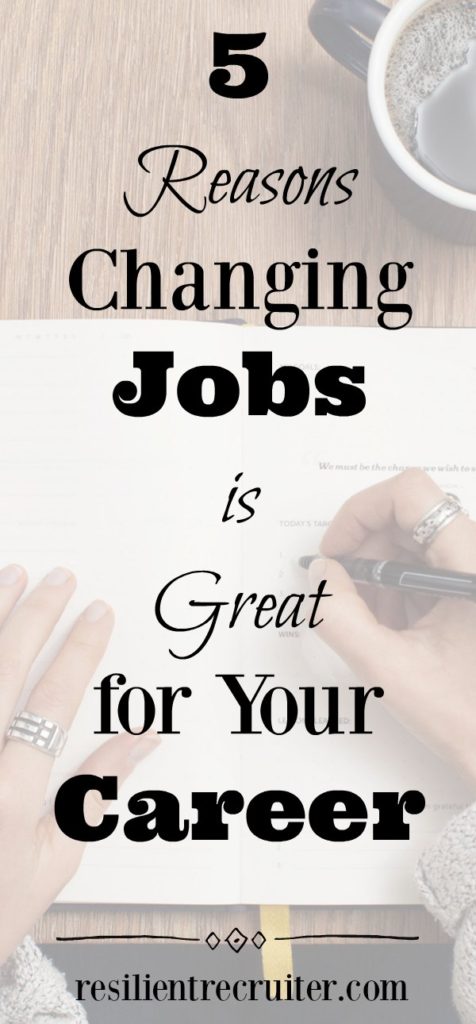Millennials continually get a bad rap. They are often criticized for not paying their dues, for expecting immediate gratification, and from a career standpoint – for changing jobs. Most Millennials were raised by Baby Boomers who spent the bulk of their careers at one or two companies. Long tenure was equated with good work ethic, loyalty and overall dependability.
But we live in a far different world today. Loyalty no longer benefits employees in the manner it used to. As a matter of fact, according to an article by Forbes, employees who stay at a company over two years make 50% less. That number is staggering!
There is no doubt – humans are creatures of habit. Finding a job that you enjoy and staying with it makes you comfortable. Enjoying your co-workers makes you comfortable. Knowing your job inside and out makes you comfortable. We crave the security that comes with familiarity.
But you won’t find “security” and “comfort” in any advice you receive from mentors, or others that are extremely successful in their field. You will find that these individuals made changes to keep them fresh and add professional challenge to their lives.
Changing jobs is good for your career. Here’s why.
1. People that change jobs have a faster learning curve.
We have already determined that changing jobs takes any professional out of their comfort zone. Stepping into a new role (and all of the cultural intricacies that are involved with a new company) forces you to become adaptable. You must shift gears and get up to speed quickly in order to add value. People with high emotional intelligence possess the ability to embrace change quickly and roll with the punches. Doing so several times throughout your career sharpens these skills even more. According to Fast Company, employees should focus on changing jobs every 3 to 5 years.
2. Changing jobs helps you to navigate office cultures.
Having the ability to get up to speed quickly will also cause a high-achieving employee to be hyper-aware of his or her surroundings. This will hone a person’s internal consulting ability. Understanding peers, subordinates and managers (and their expectations) quickly will prove beneficial, regardless of your industry or role. It will also help an employee identify healthy or toxic work environments. Having experience with multiple companies will provide insight into what environment you can succeed in – and when you need to run for the hills!
3. Individuals who change jobs have learned the art of personal branding.
As a Recruiter and HR Consultant, one of the most difficult tasks is helping an individual identify and create his or her “personal brand”. Your “brand” is your unique set of skills and insights that make you marketable as a candidate. If you wait until you lose your job (and are at the lowest and most vulnerable point in your professional life), you cannot create easily create your best brand. You are more focused on what you are not during a difficult period like a transition. Create your brand when you are feeling your best and “sell it” when you are the most marketable. People who change jobs leave on a high note and have become branding experts. They know the qualities they bring to the table and aren’t afraid to make it known.
4. People who change jobs have larger networks.
Since these individuals move around, they develop positive relationships with individuals from many companies. They have had to interview much more often, so they utilize their professional networks and keep them fresh. When they decide it is time to look again, they are able to track down colleagues, both for new job leads and for professional references. They are also open to reciprocating, as this is the key to the true meaning of networking.
5. They provide diverse wisdom.
People who change jobs have had to put themselves out there much more often than the average employee, and their wisdom shows it. Since a job changer has worked at several companies, he is she is able to provide unique insight into what has worked and what hasn’t at other organizations, potentially saving the current employer precious time and money. He or she is able to combine experience to create a unique perspective that may not be found in an individual that has never worked anywhere else. I recently had a CFO tell me that the multiple jobs one of her employees has had is “exactly what filled the gap in our department.” Someone with only one company under his belt could not have provided such a valuable contribution.
Conclusion
Even though the Millennials have been targeted for many wrongdoings in the workplace, changing jobs is not one of them. Expect to see a new appreciation and acceptance of multiple companies on a potential employee’s resume. His or her experience may just prove to be more valuable than you imagined.
by Natalie Lemons
Natalie Lemons is the Founder and President of Resilience Group, LLC, and The Resilient Recruiter and Co-Founder of Need a New Gig. She specializes in the area of Executive Search and services a diverse group of national and international companies, focusing on mid to upper-level management searches in a variety of industries. For more articles like this, follow her blog. Resilient Recruiter is an Amazon Associate.




There are so many things to learn in every situation. This is why I love to explore new opportunities.